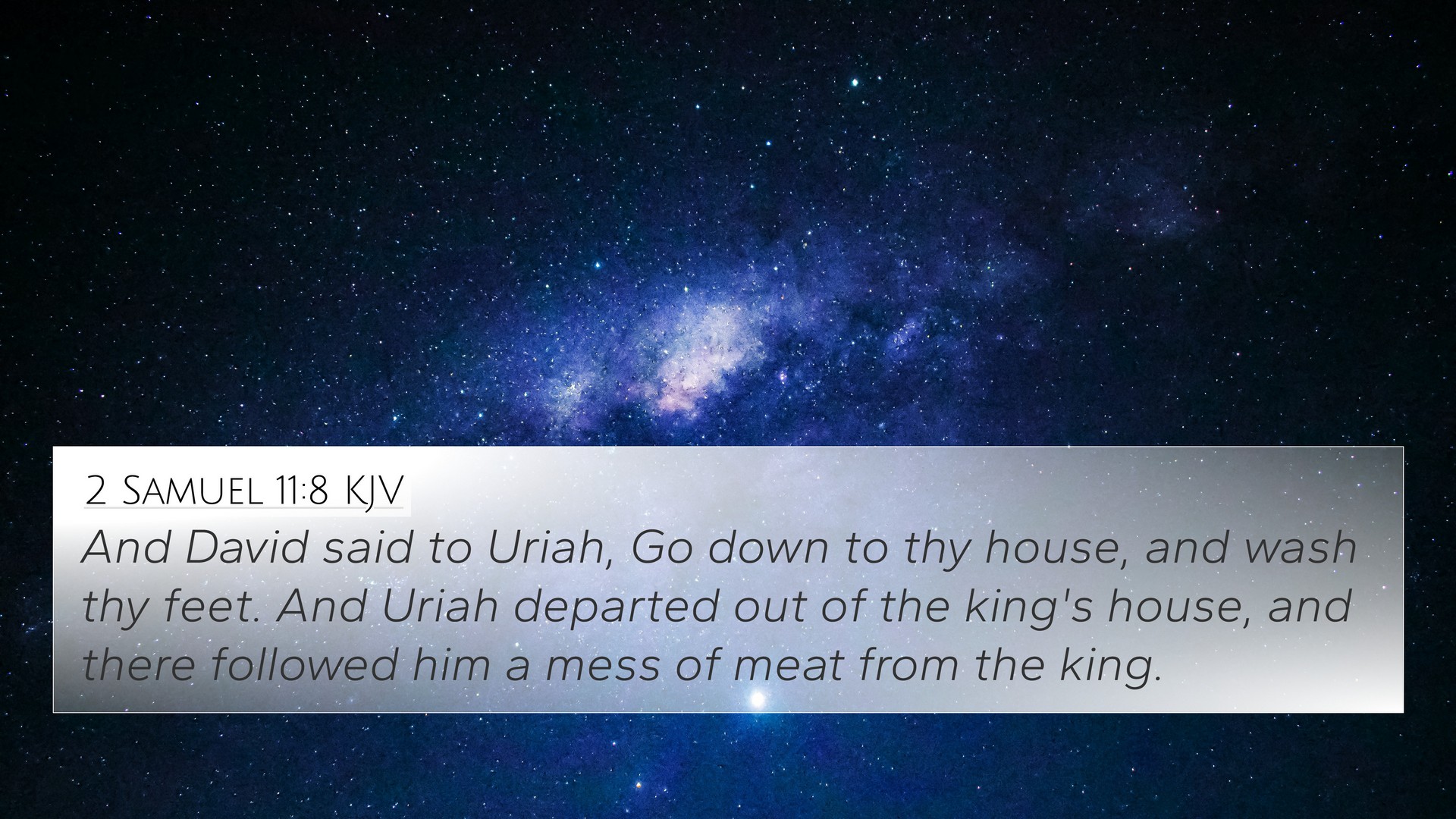Understanding 2 Samuel 11:8
Verse Text: "And David said to Uriah, Go down to thy house, and wash thy feet. And Uriah departed out of the king's house, and there followed him a mess of meat from the king."
Contextual Overview
This passage occurs in the narrative surrounding David's adultery with Bathsheba and his efforts to cover it up. After committing sin, David attempts to manipulate Uriah, Bathsheba's husband, to return home and sleep with his wife, thereby masking the consequence of his actions.
Commentary Insights
-
Matthew Henry's Commentary
Henry emphasizes the moral depravity of David's actions, showcasing how sin often leads to further transgressions. His suggestion to Uriah to return home serves to conceal his own sin. The phrase "wash thy feet" symbolically instructs Uriah to engage in domestic life, which contrasts with David's hidden motives.
-
Albert Barnes' Notes
Barnes notes the manipulative nature of David's intentions. He indicates that the king's phrase “wash thy feet” implies both personal refreshment and a return to normalcy. Uriah's obedience highlights his character, which stands in stark contrast to David’s duplicity. Barnes also discusses the broader implications of leadership, suggesting that failure can corrupt even the most revered figures.
-
Adam Clarke's Commentary
Clarke points out the importance of Uriah's loyalty and integrity. He reflects on the tragic irony that a loyal subject is being manipulated by his king. Clarke also examines the symbolism of the meal sent with Uriah, highlighting both hospitality and deceit—David attempts to create an atmosphere of normalcy in the midst of his moral failure.
Thematic Connections and Cross-References
The events surrounding this verse reveal critical themes in the Bible: manipulation, deceit, and consequences of sin. Below are some notable Bible verse cross-references:
- 2 Samuel 11:1-5 - The introduction of David's sin with Bathsheba.
- 2 Samuel 12:9-10 - Nathan the prophet confronts David about his sin.
- 1 Kings 15:5 - Acknowledgment of David's integrity, except in the matter of Uriah.
- Psalm 51 - David's repentance following his sin.
- Proverbs 28:13 - The principle that concealing sin leads to destruction.
- James 1:14-15 - The process of sin leading to spiritual death.
- Matthew 5:27-28 - Jesus' teachings on adultery enlightening the internal nature of sin.
- Romans 6:23 - The consequences of sin, correlating to ultimate separation from God.
- Galatians 6:7-8 - The principle of reaping what one sows in the context of sin.
- Hebrews 4:13 - The notion of being accountable for actions before God.
Practical Applications and Reflections
This passage serves as a potent reminder of the complexities of human nature and the pervasive impact of sin. As we reflect on King David's actions, we are confronted with the reality of moral failures that can occur even among those in high positions. It challenges believers to seek integrity in their dealings and recognize the importance of genuine repentance.
Tools for Bible Cross-Referencing
For those interested in diving deeper into the connections between Bible verses, the following tools are essential:
- Bible concordance for systematic verse identification.
- Bible cross-reference guide to assist in thematic studies.
- Cross-reference Bible study methods to outline relationships between verses.
- Bible reference resources for comprehensive scriptural explorations.
- Tools to find cross-references in the Bible, enhancing understanding of biblical interconnections.
Conclusion
In summation, 2 Samuel 11:8 reveals profound truths about human nature, sin, and the consequences of our actions. By utilizing the insights from biblical commentaries and understanding thematic connections through cross-referencing, readers can gain a deeper appreciation for the scripture and its implications for faith and conduct in their lives.













